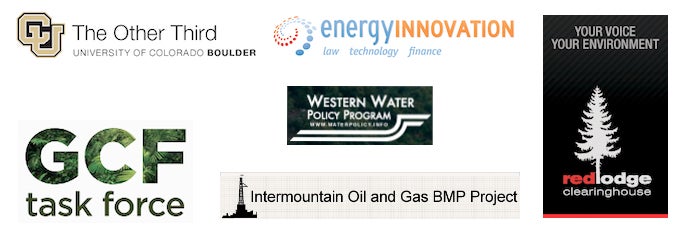Getches-Wilkinson Center for Natural Resources, Energy, and the Environment
Serving the people of the American West, the nation, and the world through creative, interdisciplinary research, bold, inclusive teaching, and innovative problem solving in order to further true sustainability for our lands, waters, and environment.

Now Available
Colorado River Future Project
The Colorado River: A Roadmap for the Secretary of the Interior
Colorado River Policy: Opportunities for Tangible Progress
Spring 2016 GWC Newsletter
Getches-Wilkinson Center Fall 2016 Newsletter
New Publications Available
Colorado State Water Plan: Publications
Recent Publications
A Roundtable Discussion on the No-Injury Rule of Colorado Water Law
In October 2014, the Getches-Wilkinson Center sponsored a roundtable discussion featuring a diverse group of expert water jurists, water lawyers, water engineers, state water officials, and academics on Colorado water law and Colorado water policy. The workshop discussed one aspect of the state's water law that is seen by some as impeding the type of flexibility needed to avoid a crisis-namely the "no-injury rule." The full article appeared in the July 2015 issue of The Colorado Lawyer, and can be found here.
Navigating a Pathway Toward Colorado's Water Future: A Review and Recommendations on Colorado's Draft Water Plan
In the spring of 2015 the Getches-Wilkinson Center convened a group of renowned water policy experts to conduct a detailed review of the draft of the Colorado State Water Plan, with an emphasis on plan implementation, water management, climate change adaptation, and public water uses. This report reviews the current plan and provides conclusions and recommendations in five areas. This report was released by the Getches-Wilkinson Center and can be found here.
Now Available
Getches-Wilkinson Center Spring 2016 Newsletter
Projects
Clinics
Natural Resources Clinic
Led by Professor Michael Soules, Colorado Law's Natural Resources Clinic is one of the nation’s first, opening in 1978. Originally, Clinic students worked in conjunction with staff attorneys at the National Wildlife Federation on environmental issues such as protecting federal public lands managed by the Bureau of Land Management and the U.S. Forest Service. In Spring 2010, the Clinic moved in-house to the Law School. It continues to focus on issues related to public lands, and students work on projects before administrative agencies, state and federal courts, and state legislatures.
American Indian Law Clinic
The American Indian Law Clinic, established in 1992 as one of the first of its kind, provides quality legal representation to low-income clients with specific Indian law related problems. Many in the Denver region have limited access to legal assistance and that access is further restricted when the issue involves Indian law. They have nowhere to turn when certain rights, some guaranteed by treaty, are denied. The Clinic’s student attorneys provide hundreds of hours of pro bono legal work to assist these people with direct legal assistance when possible, or by acting as a referral source when unable to help directly.

